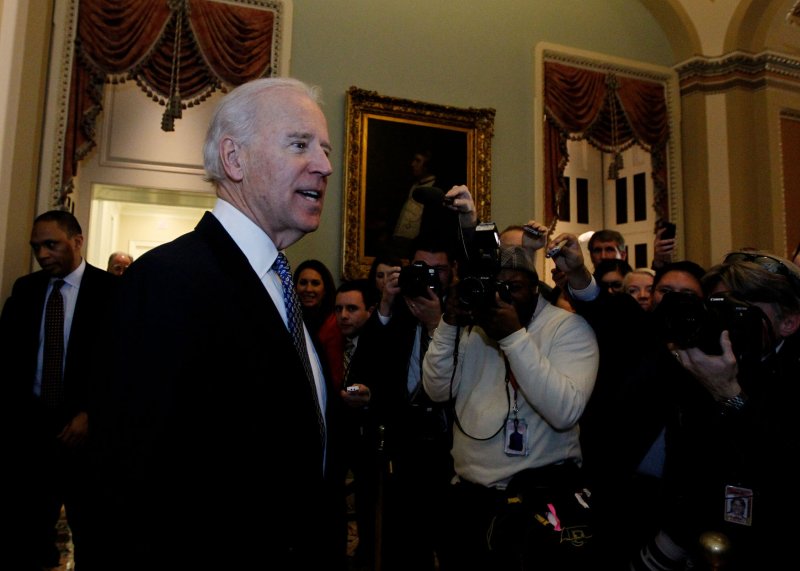Vice President Joe Biden negotiated the "fiscal cliff" legislation with Senate colleagues to avert massive tax hikes and spending cuts that had been scheduled to take effect Jan. 1. The question now is whether such a bipartisan solution can be found for the debt ceiling. Dec. 31 file photo. UPI/Molly Riley |
License Photo
If compromise is an art, we probably shouldn't expect any masterpieces out of Congress.
Members' next opportunity to exhibit their inability to see the other side of an issue -- or maybe it's their preference to play to narrow audiences to assure their own political survival at the expense of the nation as a whole -- is the debt ceiling.
Before the champagne corks popped on New Year's Eve, the United States hit the $16.4 trillion limit Congress had authorized the nation to borrow. The debt ceiling is supposed to serve as a brake on congressional spending but in part because Congress has failed to pass a budget for the last three years, little effort has been made to rein in outlays -- despite the rhetoric.
The last time the debt ceiling came up for a vote, in the summer of 2011, Republicans held it hostage so long stock markets were hit with the jitters and the U.S. credit rating took a hit -- a result that makes borrowing even more expensive.
Congress has voted to raise the debt ceiling more than 100 times since 1940 -- 18 of them under Ronald Reagan alone -- in what had become a routine vote.
This time around, with the GOP already smarting from the "fiscal cliff" debacle, rhetoric is flying, promising to make the coming round no less exciting.
The public is not amused.
Congress is now less popular than root canals, NFL replacement referees, head lice, the rock band Nickelback, colonoscopies, carnies, traffic jams, cockroaches, Donald Trump, France, Genghis Khan, used-car salesmen and Brussels sprouts, a Public Policy Poll indicates, although lawmakers are more popular than telemarketers and meth labs. The PPP telephone survey queried 830 voters Jan. 3-6.
A petition on the White House website comes at the debt problem from a creative perspective, directing the U.S. Mint to strike a platinum coin worth $1 trillion and deposit it with the Treasury. Poof, no more debt -- or at least not much by comparison.
"While this may seem like an unnecessarily extreme measure, it is no more absurd than playing political football with the U.S. -- and global -- economy at stake," the petition, which was posted Jan. 3, reads. As of midday Sunday, 7,929 people had signed the petition, which needs 25,000 signatures by Feb. 3 before the White House will formally respond.
The White House apparently has dismissed the concept.
"Look, there is no plan B. There is no backup plan," White House spokesman Jay Carney told reporters during Wednesday's news briefing. "There is no alternative to Congress raising the debt ceiling. Congress has to pay the bills of the United States. That is an obligation they assigned to themselves."
A second petition calls for impeachment of "the GOP Congress, immediately withhold their pay and all benefits ... retroactive to [Nov. 7]."
"The majority of American voters have made it clear what they expect from elected officials, the GOP Congress continues to represent less than 1 percent of the population in the USA! They abandon their duties, and when they are present they do not accomplish what the majority has said they want," the petition, which had garnered 3,121 signatures as of midday Sunday, reads. "They are injurious to the people of the USA, and they abuse their positions and their misconduct is egregious. Impeach the GOP Congress, retroactively withhold their pay and benefits."
Congressional Democrats have other ideas.
Sen. Tom Udall, D-N.M., told The Hill he thinks President Obama has the authority to raise the debt ceiling on his own, using the powers granted him by various statutes to pay the country's bills and Section 4 of the 14th Amendment ("the validity of the public debt of the United States ... shall not be questioned") to protect the economy from damage.
Arguments about raising the debt ceiling likely will revolve around entitlement programs, which Republicans have been lobbying to gut for years. Proposals have included the privatization of Social Security and turning Medicare into a voucher system.
Udall notes the Second Liberty Bond Act of 1917, which set up the debt ceiling to avoid making Congress vote on each individual bond issue, is at odds with the Social Security Act of 1935, the Medicare Act of 1965 and a number of appropriations laws. He argues Obama can ignore the debt ceiling because he has the authority to use his discretion when laws conflict.
As the issue simmered in advance of Congress' scheduled return to Washington this week, outgoing Treasury Secretary Timothy Geithner was using accounting tricks to keep government payments moving. He has said the books can be juggled for about two months.
Senate Minority Leader Mitch McConnell, R-Ky., may be ready to deal.
"These last-minute deals are no way to run the government," he recognized recently on ABC's "This Week." "Why we end up in these last-minute discussions is beyond me."
But Senate Minority Whip John Cornyn, R-Texas, appears to be consulting a different playbook. He said in a recent op-ed in the Houston Chronicle a partial government shutdown might be the solution for the "fiscal well-being of our country."















